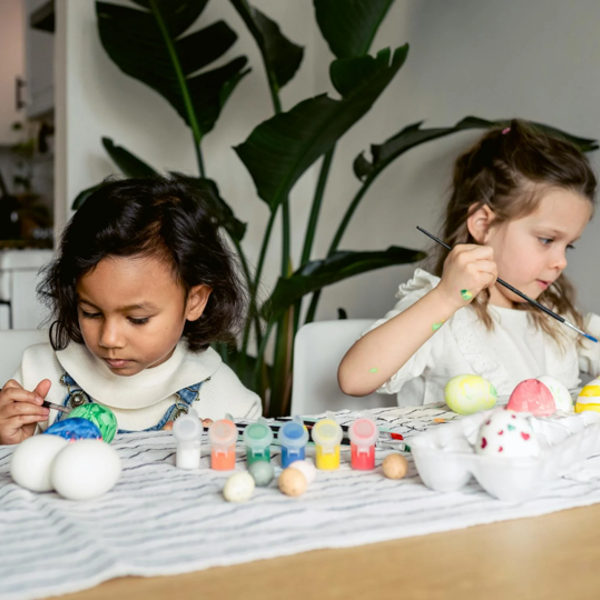Easter is sometimes seen as the most important celebration in the Christian calendar, as it celebrates the resurrection of Jesus. Holy Week begins on Palm Sunday, the Sunday before Easter Sunday, which celebrates Jesus' arrival in Jerusalem, and includes Maundy Thursday, when Christians remember the Last Supper; Good Friday, which commemorates the day Jesus died on the cross; and Easter Sunday, which celebrates Jesus rising from the dead.
People who aren’t Christians also celebrate Easter, with families taking part in Easter-themed activities such as Easter egg hunts. If you are caring for a child or young person who observes a faith other than Christianity, talk with them about how they usually spend this time.
In this blog, we have put together some ideas and resources for those celebrating Easter with the children and young people in their home.
1. Learning about Easter
There are lots of resources available to help the children and young people in your home to learn about the importance of Easter for Christians. This page from BBC Bitesize has lots of information (including an explanation of why we give Easter Eggs!) as well as fun learning activities and quizzes.
2. Easter church services
If appropriate, ask the children and young people in your home if they would like to attend an Easter church service. You could contact your local church to find out about their Easter services, as some churches may be running services specifically for children and young people. For more information on the importance of supporting all children to explore and practice their background and faith, see our webpages here.
3. Easter performances
Check if your local church or cathedral is advertising any free Easter events or performances. For example, in London there is a free commemoration and re-enactment of Good Friday, but there may be similar performances happening in your local area. For full details of the London performance, look here.
4. Getting crafty
There are lots of Easter crafts you can do to keep everyone busy! You could decorate hard-boiled or wooden eggs, make easter cards or bookmarks, create an origami cross, or play a game of pin the tail on the rabbit! There are lots of craft inspirations and instructions available online, including from BBC Good food here and Christians Against Poverty here.
5. Easter egg hunts
Taking part in an Easter egg hunt can be a fun game for everyone to join in with. You could set this activity up in the garden or inside, depending on the weather, and could use small chocolate eggs or a non-edible alternative – just remember to make a note of any hard-to-reach eggs so they don’t get forgotten if they’re not found! You could also keep an eye out for any Easter egg hunts being run by local organizations in your area.
6. Nature trails
If the weather is nice, why not head out for a walk and create a free, springtime nature trail? You could agree a list of things you would like to find on a nature scavenger hunt, such as particular animals, flowers, or trees! Parent Talk from Action for Children have lots of ideas for how you can plan a nature trail here.
7. Sweet treats
There are lots of Easter-themed sweet treats you could bake together. From chocolate Easter egg nests to Easter-bunny cupcakes, there are lots of ideas to choose from! The BBC have put together lots of fun easter baking ideas here.
8. Savoury snacks
If you are looking for fun, savoury snack ideas, have you considered trying Easter-bunny shaped hard boiled eggs, or carrot-pot humous? Check out these creative ideas and more on the BBC Good Food website here.
9. Bank holiday events
If you are looking for a day out, you could search for local events happening over the bank holiday weekend and school holiday. For example, you could look to see if there are any food festivals near you or see if there are any special events planned at local community or heritage spaces.
10. Support over the bank holiday
Fosterline will be open until 5.00pm on Thursday 17 April and we will re-open at 9.00am on Tuesday 22 April. If you leave us a voicemail on our helpline (0800 040 7675), send us email ([email protected]), or complete our contact form (available here) over this period, we will get back to you as soon as we are able when we re-open on Tuesday 22 April.
For emergencies, please contact your fostering service or local authority who will have an out-of-hours provision in place.




